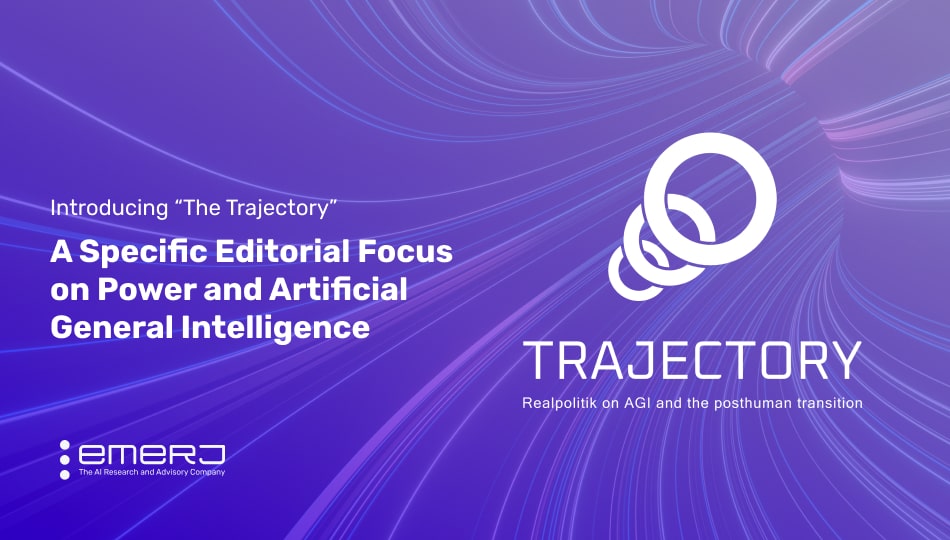
This week, I’m announcing The Trajectory, a new video channel, podcast, and newsletter.
In this new series, I’ll delve into the realpolitik of artificial general intelligence (AGI) and the post-human future.
In simple terms, this means that The Trajectory will focus on three pivotal questions:
- Who are the AGI power players, and what are their incentives?
- What kind of post-human future are we moving toward, or should we be moving toward?
- What should we do about it?
Here’s the short introductory video to the series itself:
Follow the Trajectory:
Between 2012 and 2020, investments in AGI have increased 50-fold. Almost needless to say, having a seat at the table for these developments has been a humbling experience.
From our research to engaging with international organizations like the OECD and the United Nations, Emerj’s singular mission over the last decade has been discussing AI with some of the brightest minds in the field – from the heads of AI at Raytheon and US Bank to the founders of unicorns such as Dataiku and OpenAI.
Our guests’ broad and diverse perspectives regarding the transformative impact of AGI now have informed our perspective of its impact in the near future.
Even just a few years ago, very few organizations focused on AI governance or what these developments might mean for our species. Fast-forward to present-day, and it’s a far more crowded space.
During the same period, intergovernmental organizations never took up the discussion of AGI, at least in a way that looked beyond the very short-term ramifications of the technology – and even these discourses were rare. Today, all of them have several AI projects in the works.
 (Source: OECD)
(Source: OECD)
The international conversation writ large about AI has grown more serious, demanding commentary and policy from the most established global leaders.
Secretary-General of the UN António Guterres is now ringing alarms about the potential existential risk of AI and what should be done about it. The Biden Administration is issuing sweeping trade restrictions on exporting AI hardware to China and other countries. The OECD issued a framework governing AI principles, and new legislation from the European Union is not far behind.
These are issues that governments should be addressing. Why? First, because advanced AI technologies can be hazardous for human beings. Second, the leveraging and use of these technologies will absolutely define the balance of political power on a global scale.
As it stands now, the conversations around AI – in both the technological and policy arenas – are minimal for two reasons:
- They are almost entirely focused on near-term policy implications: “Do we speed up AI development or slow down?”, “How do we make AI safe?” – these are almost always the topics that dominate the AI conversation. Yet, these are minor disagreements when compared to the central, overarching question: To what end are we developing AI? Such a critical inquiry means putting on the table the significant differences that crucial players have concerning the long-term goal of AI integration in the post-human transition.
- Moralizing instead of dealing with issues: This approach to AI discourse is typically unproductive and dishonest. From founders of AI startups accusing any attempt to regulate AI as “anti-capitalist” to policymakers droning on about the “evils” of AI tech and how said founders are concerned only about profit, this moralizing is harmful to progress. The only inevitable outcome is that progress is stymied.
The narrative must shift, and this is what the Trajectory will accomplish. The Trajectory will use a two-pronged approach in our interviews with AI researchers, thinkers, and policymakers. Both of these conversational strategies are designed to counteract the fruitless narratives that inevitably result from the two previously-mentioned approaches to the AI conversation above:
- Long-game post-human focus: No more small talk about relatively inconsequential short-term policy decisions. But instead, what are we aiming towards? What is a productive combination and level of interaction between man-machine intelligence? How will we successfully hand off a stable state of this relationship dynamic to future generations?
- Facing incentives squarely: The Trajectory will operate on the logical basis that any degree of moralizing or “Holier than Thou” attitudes inevitably sets progress backward. That does not mean that the moral implications of AI development are not essential and worthy of discussion; only extreme views are pointless either way.
If you’re intrigued by the realpolitik of AGI and what it means for our post-human aspirations, join us at the Trajectory. Together, we will explore the wild possibilities and potentials for the human species in a fun and honest way.
We’ll converse about the complex web of power dynamics, AI innovations, and policy decisions that will shape our collective human destiny. We will also recognize the reality of the challenges while aspiring to make life simpler and easier with sober deliberation. Above all, we look forward to having you with us on this journey.
Follow the Trajectory:







